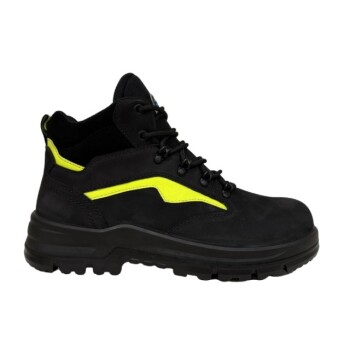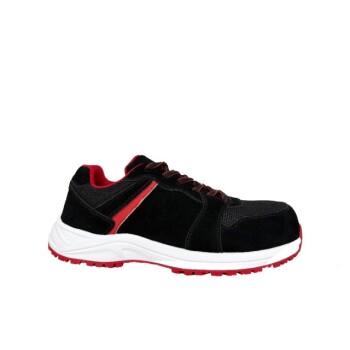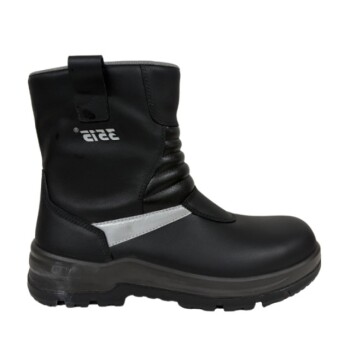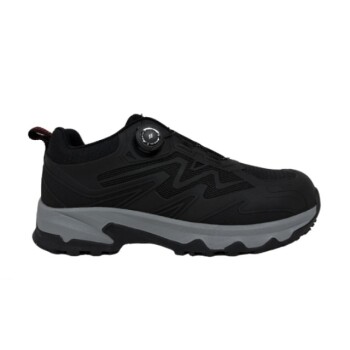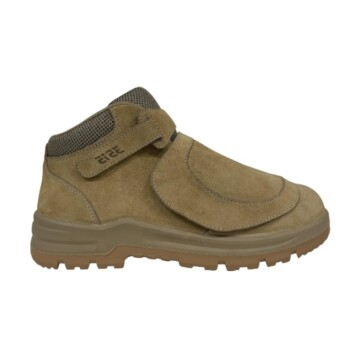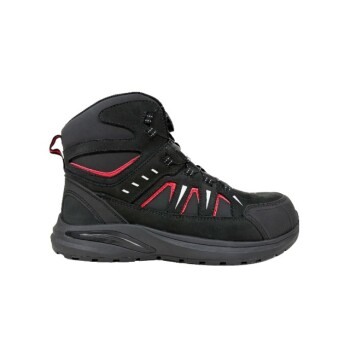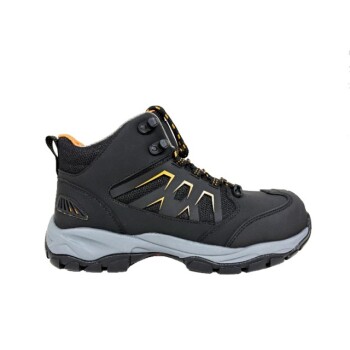To be direct, choosing the correct footwear for your job is a critical safety decision. It is the most effective way to provide direct protection against a wide range of common workplace hazards. Proper footwear is not merely an accessory; it is a fundamental piece of Personal Protective Equipment (PPE) designed to prevent injury and ensure you can perform your duties safely and effectively.
The core purpose of job-specific footwear is to create a barrier between your feet and the unique hazards of your work environment. This goes beyond simple comfort, encompassing mandatory safety compliance, injury prevention, and long-term physical health.
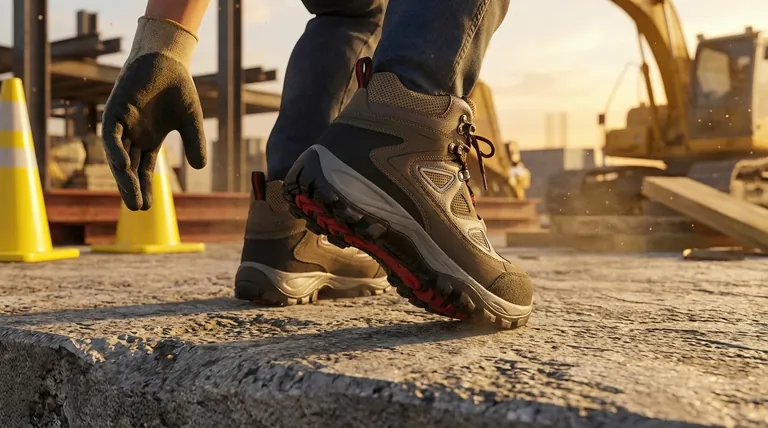
Deconstructing "Correct" Footwear: Key Components
Understanding what makes footwear appropriate requires looking at its individual components. Each part serves a distinct protective or supportive function that must align with your job's demands.
The Foundation: Outsole and Midsole
The outsole is the part that contacts the ground. Its material and tread pattern are critical for providing slip resistance on wet, oily, or uneven surfaces.
The midsole provides cushioning and absorbs shock. A well-designed midsole reduces fatigue over long shifts and protects your joints from the repetitive stress of standing or walking on hard surfaces.
The Shield: The Upper and Protective Features
The upper refers to the entire part of the shoe that covers the foot. Materials range from durable leathers to breathable synthetics, often incorporating features like waterproofing for outdoor work.
Many roles require a safety toe (often steel or composite) to protect against crushing injuries from falling objects. A shank, a rigid piece in the sole, can provide puncture resistance from below.
Matching Footwear to Your Environment
The "correct" choice is entirely dependent on context. A boot that is perfect for a construction site is dangerously inadequate in an environment with electrical hazards.
Assessing Specific Workplace Hazards
First, identify your primary risks. These could include falling objects, sharp materials on the ground, chemical spills, extreme temperatures, or slippery floors.
Some roles even require specialized protection, such as against bloodborne pathogens (BBP) for public safety professionals or electrical hazard (EH) ratings for electricians.
The Role of Compliance and Certification
Many industries have mandatory safety requirements. "Correct" footwear is often defined as footwear that meets specific safety certifications (like ASTM standards).
Compliance is non-negotiable and is the first filter you should apply when selecting your footwear.
Considering Job-Specific Demands
Beyond pure hazard protection, consider the physical demands of your role. A public safety officer needs a lightweight and flexible boot for mobility.
In contrast, a logger may need a much heavier, more rigid boot for ankle support and maximum durability. Some roles may even require a polishable toe for uniform compliance or non-metallic construction for high-security areas.
Understanding the Trade-offs
No single shoe is perfect for every situation. Choosing footwear involves balancing competing priorities, and being aware of these trade-offs is key to making an informed decision.
Protection vs. Mobility
Heavier, more protective boots with steel toes and thick soles offer maximum protection against impacts and punctures. However, this added bulk can reduce flexibility and increase fatigue over a long day.
Durability vs. Immediate Comfort
The most durable materials, like thick-cut leather, often require a break-in period to become comfortable. Lighter, more flexible synthetic materials might feel better out of the box but may not withstand the same level of abuse.
Specialized Features vs. Versatility
A highly specialized boot—for example, one designed exclusively for electrical hazard protection—may lack features like aggressive tread needed for outdoor work. Focusing too heavily on one feature can limit the footwear's utility in other contexts.
Making the Right Choice for Your Goal
Your final selection should be a deliberate decision based on a clear understanding of your daily tasks and the environment in which you perform them.
- If your primary focus is maximum safety in a hazardous environment (e.g., construction, manufacturing): Prioritize certified safety toes, puncture-resistant soles, and highly durable upper materials.
- If your primary focus is mobility and agility in a variable environment (e.g., law enforcement, logistics): Seek out lightweight construction, slip-resistant outsoles, and a balance of flexibility and support.
- If your primary focus is all-day comfort on hard surfaces (e.g., warehousing, healthcare): Emphasize superior cushioning in the midsole, a supportive footbed, and a breathable upper.
Ultimately, the right footwear is a foundational tool that directly contributes to your safety and effectiveness at work.
Summary Table:
| Footwear Component | Key Function | Common Hazards Addressed |
|---|---|---|
| Outsole | Slip Resistance | Wet, oily, or uneven surfaces |
| Safety Toe | Impact Protection | Falling or rolling objects |
| Midsole | Shock Absorption & Fatigue Reduction | Long hours on hard floors |
| Upper Material | Durability & Environmental Protection | Abrasion, chemicals, water |
| Puncture-Resistant Shank | Penetration Protection | Sharp objects on the ground |
Need the Right Footwear for Your Team?
As a large-scale manufacturer, 3515 produces a comprehensive range of certified safety footwear for distributors, brand owners, and bulk clients. Our production capabilities encompass all types of occupational shoes and boots, designed to meet the specific demands of industries like construction, logistics, and public safety.
We ensure your workforce is equipped with durable, compliant, and purpose-built footwear that enhances safety and productivity.
Let's discuss your specific needs: Contact 3515 today for a tailored solution.
Visual Guide
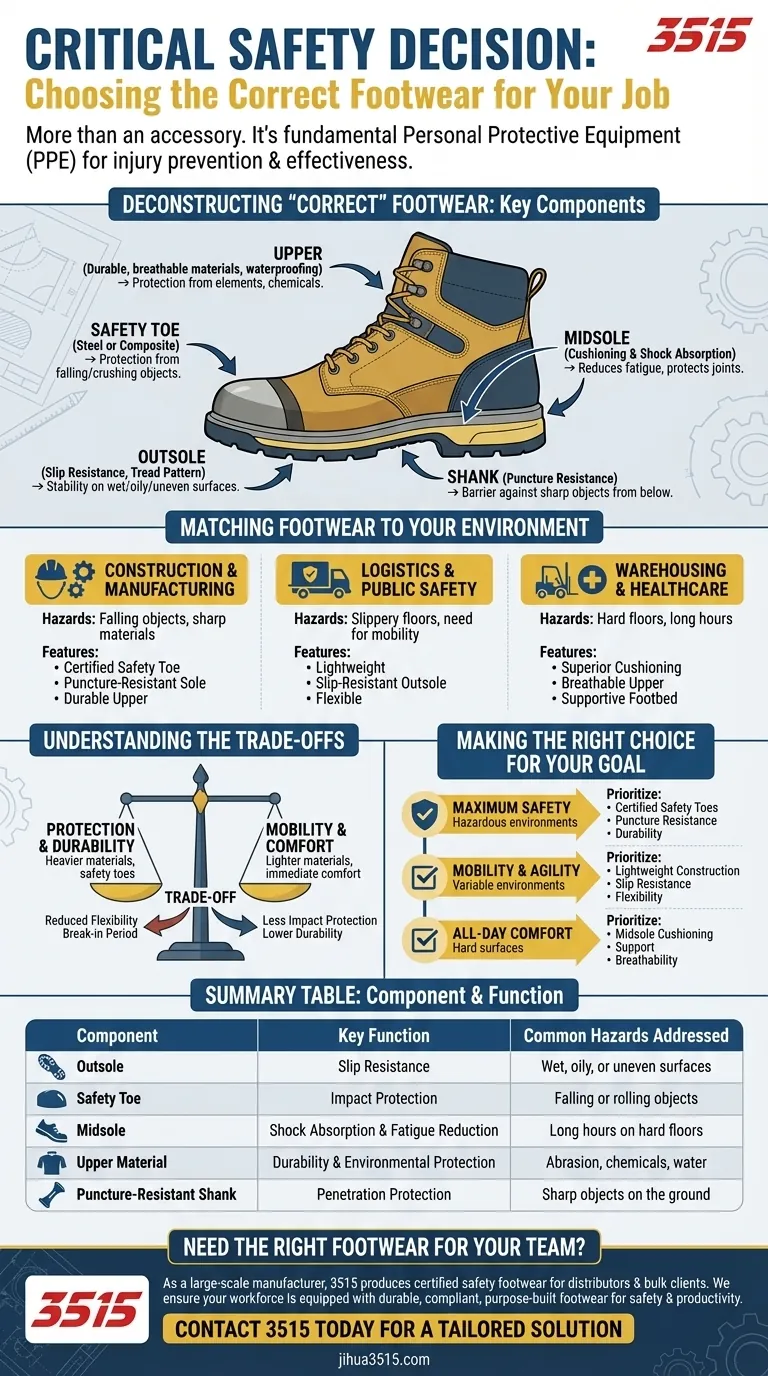
Related Products
- Safety Footwear Wholesale Manufacturer for Custom OEM/ODM Production
- Premium Flame-Retardant Waterproof Safety Boots and Shoes
- Wholesale Premium Waterproof Nubuck Safety Shoes Boots
- Premium Suede Sport Safety Shoes for Wholesale & Bulk Orders
- Premium Waterproof High-Cut Industrial Safety Boots for Wholesale and Bulk Orders
People Also Ask
- What do heavy duty boots do? Protect Your Feet in Demanding Work Environments
- What are the cultural perspectives on wearing shoes in the house? A Guide to Home Etiquette & Hygiene
- How long can you wear safety boots? The Lifespan is Determined by Wear, Not Time
- Do snake bite boots work? Your Ultimate Guide to Effective Snake Bite Protection
- Is it normal to wear shoes in the house? A Guide to Hygiene, Comfort & Culture


